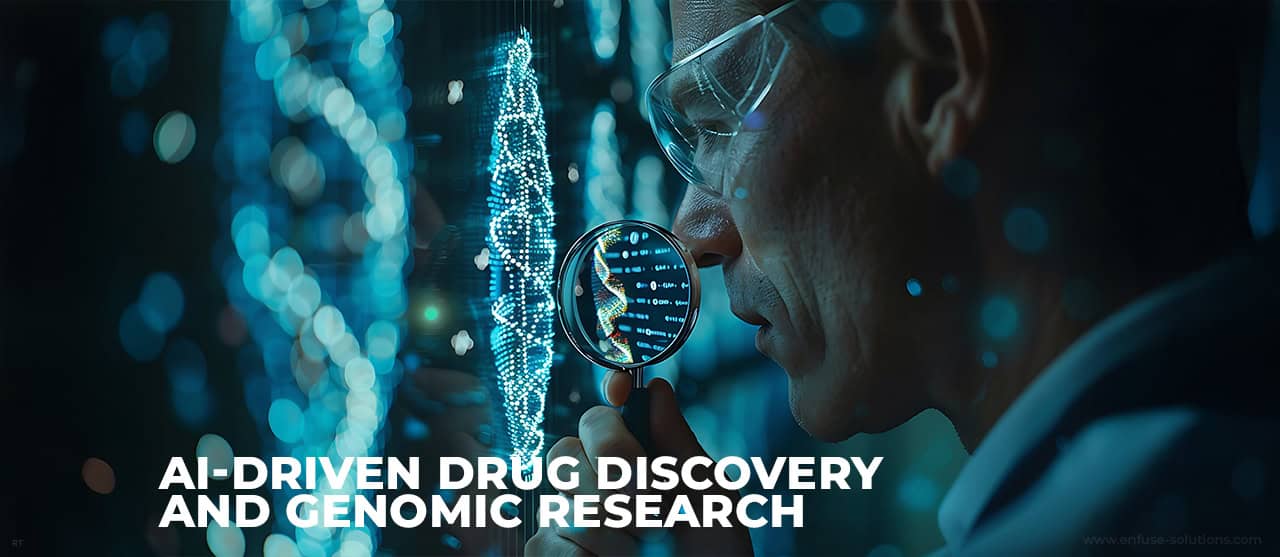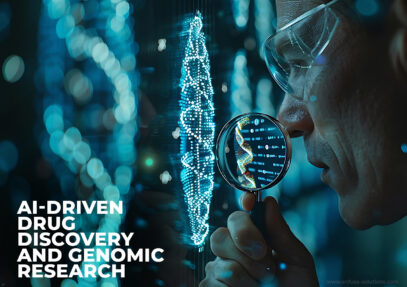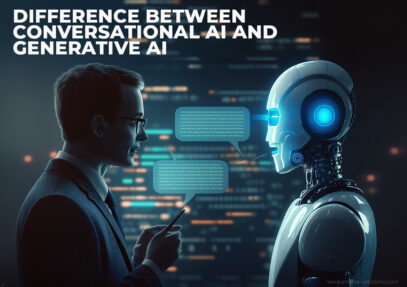
In recent years, artificial intelligence (AI) has sparked transformative changes in fields once dominated by traditional research methodologies. Drug discovery and genomics have emerged as two of the most promising areas benefiting from AI integration.
With the global AI in the healthcare market projected to grow at a compound annual growth rate (CAGR) of 38.5% from 2024 to 2030, reaching approximately $187.95 billion by 2030, the impact of AI on drug discovery and genomic research is both profound and accelerating. At the heart of these advancements is generative AI, a technology redefining how scientists identify drug compounds, predict biological interactions, and hasten genomics research.
The Current Landscape Of Drug Discovery And Genomic Research
The usual drug discovery process is extensive, frequently taking over a decade and costing billions. Genomic research, essential for personalized medicine, faces similar challenges in terms of time, cost, and accuracy. AI, and more specifically generative AI, is alleviating these challenges by offering new techniques that save time and reduce costs.
AI’s entrance into drug discovery has brought powerful data processing capabilities, allowing researchers to handle enormous datasets that were previously unmanageable. In genomics, AI-driven tools are helping scientists uncover patterns in DNA, leading to breakthroughs in personalized medicine. A 2023 report indicates that AI-driven methods could reduce the drug discovery time by nearly 50%, allowing life-saving treatments to reach the market much faster.
Drug Discovery With Generative AI: Unlocking New Potentials
Generative AI is poised to revolutionize drug discovery by accelerating the initial stages of identifying viable drug compounds. Unlike traditional AI, which relies on patterns within existing data, generative AI models like GANs (Generative Adversarial Networks) and transformers create entirely new data points based on learned patterns. In drug discovery, this translates to the ability to design novel molecules and compounds, significantly expanding the pool of potential therapeutics.
1. Identifying New Drug Compounds
Generative AI allows researchers to “imagine” new molecules that could act as potential drug candidates. Companies like Insilico Medicine are leveraging AI models to design molecules with properties tailored to specific disease targets. A report by MarketsandMarkets predicts that the AI-driven drug discovery market will reach $4.9 billion by 2028, indicating the growing reliance on AI technologies to uncover drug compounds that were previously beyond human reach.
2. Predicting Biological Interactions
Beyond merely creating new compounds, generative AI predicts how these compounds will interact with biological systems. Artificial intelligence (AI) models can predict the safety and efficacy of drug candidates by mimicking molecular interactions, which enables the early rejection of those with low potential. In 2022, researchers demonstrated that AI could predict protein-ligand binding, a crucial aspect in drug development, with a high degree of accuracy.
3. Accelerating Preclinical Testing
AI helps streamline preclinical testing by automating data analysis, identifying the most promising compounds quickly, and reducing the need for extensive laboratory tests. Pfizer, for example, has employed AI to enhance preclinical stages, resulting in a more efficient drug development pipeline.
Genomic Research Transformed By AI: Precision And Personalization
Genomic research underpins personalized medicine, aiming to tailor treatments to an individual’s genetic profile. AI has proven indispensable in this field, enabling rapid analysis of complex genetic data and making breakthroughs in identifying genetic markers for diseases.
1. Decoding Genomic Data Faster
Genomic data sets are vast, containing millions of data points for each individual. AI algorithms process these volumes much faster than traditional methods, drastically reducing the time it takes to analyze genetic variations. In fact, AI has cut sequencing times from weeks to mere hours, allowing researchers to identify genetic mutations linked to diseases such as cancer, diabetes, and Alzheimer’s more efficiently.
2. Enhancing Precision Medicine
With AI-driven genomics, researchers can develop targeted treatments based on individual genetic profiles. Generative AI plays a significant role here, helping researchers simulate how different genetic makeups might respond to various drugs. According to a 2022 study published in Nature Genetics, AI has boosted precision medicine efficacy rates by approximately 35% due to more accurate predictions in patient responses.
3. Identifying Disease Markers And Genetic Mutations
AI algorithms can pinpoint disease markers and mutations that increase susceptibility to certain conditions. The technology is being used to identify markers for early disease detection, offering hope for interventions that could mitigate or even prevent certain genetic diseases.
Generative AI: Shaping The Future Of Drug And Genomic Research
The capabilities of generative AI are especially promising in accelerating genomic studies. By simulating mutations and gene expressions, generative AI can predict potential health impacts, assisting in early disease prevention. As AI models evolve, their ability to decode human DNA will unlock new layers of information about hereditary diseases and treatment responses, promising revolutionary changes in healthcare.
A 2023 McKinsey report emphasizes that AI has the potential to generate annual savings of $200-$300 billion in healthcare by improving decision-making in drug discovery and genomics. As generative AI models advance, these savings are likely to increase, enabling pharmaceutical companies and research institutions to invest further in R&D and bring life-saving solutions to the market faster.
Key Benefits Of AI In Drug Discovery And Genomics
- Accelerated Discovery Process: By automating data analysis and generating predictive models, AI reduces drug discovery timelines from years to months.
- Cost Efficiency: By reducing the need for physical trials and expediting chemical identification, AI lowers the cost of medication discovery.
- Higher Success Rates: Predictive modeling in AI enables researchers to identify the most promising compounds early, improving the likelihood of successful outcomes in clinical trials.
- Personalized Treatment Options: In genomics, AI enables a deeper understanding of genetic data, paving the way for treatments tailored to each individual, which is particularly valuable in oncology and rare genetic diseases.
Ethical And Practical Considerations In AI-Driven Drug Discovery
While AI offers unprecedented potential, ethical considerations remain. The transparency of AI models, patient privacy, and ensuring equitable access to AI-driven treatments are crucial factors to address. Additionally, as AI models become more complex, there is a need for regulatory oversight to ensure that AI-generated compounds and genetic modifications adhere to safety standards.
EnFuse Solutions: Powering The Future Of Drug Discovery And Genomic Research
As a leading provider of AI and data solutions, EnFuse Solutions supports pharmaceutical companies and genomic research institutions in implementing cutting-edge technologies. Leveraging their expertise in data annotation, AI model training, and data management, EnFuse Solutions aids clients in streamlining drug discovery pipelines and enhancing genomic research accuracy. From curating high-quality datasets for training models to ensuring regulatory compliance, EnFuse Solutions plays an integral role in the AI-driven transformation of healthcare.
Conclusion: Embracing AI For A Healthier Future
A new era of medical progress is being ushered in by AI-driven medication discovery and genetic research. With generative AI at the helm, identifying new drug compounds, predicting biological interactions, and accelerating genomics research are no longer distant goals but present-day realities. The technology not only promises faster drug development but also a more personalized approach to treatment, with substantial implications for patient care worldwide.
EnFuse Solutions stands at the forefront of this transformation, offering essential services to support the pharmaceutical and healthcare sectors in their AI journeys. For organizations looking to accelerate their R&D with data-driven insights and AI solutions, EnFuse Solutions provides the expertise and resources needed to lead in this innovative field.
Connect with EnFuse Solutions today to harness the power of AI for your research initiatives and contribute to a healthier, more resilient future. By embracing AI, we are not only advancing healthcare but also making strides toward a future where medicine is faster, more precise, and deeply personalized.

















Comment